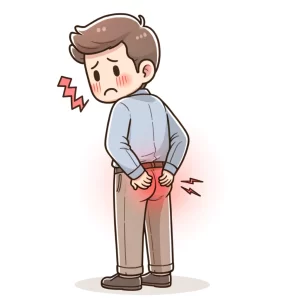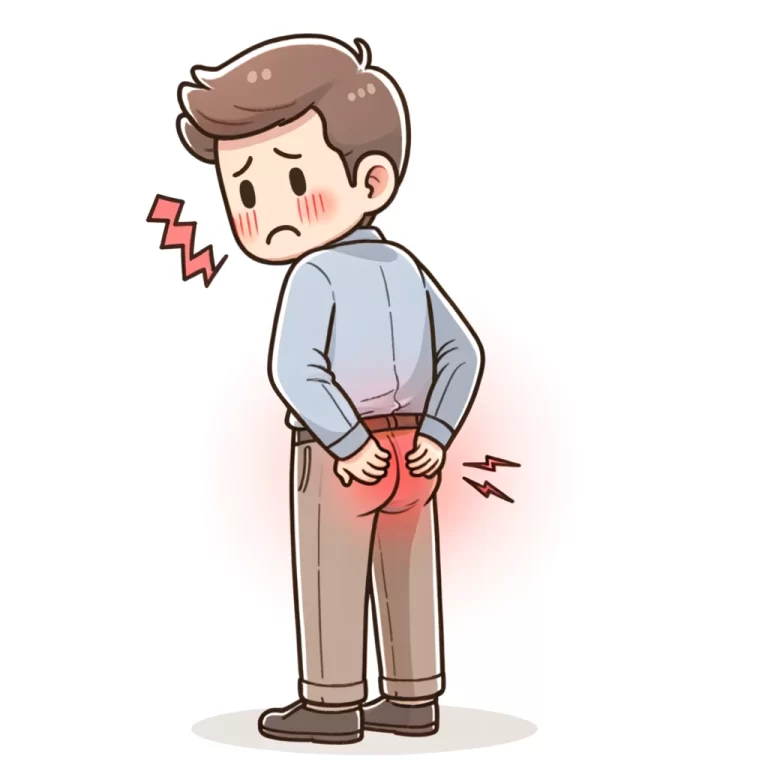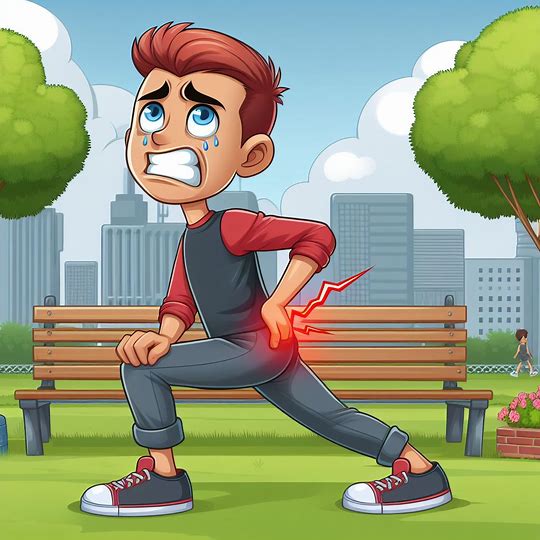What Causes an Inflamed Anus?

An inflamed anus, a common and often uncomfortable condition, can significantly impact an individual’s quality of life. This condition, characterized by irritation, swelling, and sometimes pain around the anal opening, is not just a source of discomfort but also a sign that something is amiss with rectal health. Understanding the causes of an inflamed anus is the first step toward effective treatment and relief. This article delves into the various factors that can lead to this condition, providing insights into prevention and care.
Common Causes of An Inflamed Anus
1. Hemorrhoids: Hemorrhoids are swollen blood vessels located in the lower rectum or around the anus. They can be internal or external and are a prevalent cause of anal inflammation. Straining during bowel movements, chronic constipation, and prolonged sitting can exacerbate this condition.
2. Anal Fissures: An anal fissure is a small tear in the lining of the anus, often caused by passing hard or large stools. This condition can cause severe pain and bleeding, leading to inflammation.
3. Infections: Various infections can lead to an inflamed anus. These include sexually transmitted infections (STIs) like herpes, gonorrhea, and chlamydia, as well as bacterial infections such as streptococcus. Fungal infections, often resulting from prolonged moisture in the anal area, can also cause inflammation.
4. Dermatological Conditions: Skin conditions such as eczema, psoriasis, and contact dermatitis can manifest around the anus, leading to inflammation, itching, and discomfort.
5. Inflammatory Bowel Disease (IBD): Conditions such as Crohn’s disease and ulcerative colitis can cause inflammation throughout the digestive tract, including the anus. These chronic diseases can lead to a host of symptoms, including an inflamed anus.
6. Poor Hygiene or Overwashing: Improper cleaning of the anal area can lead to irritation and inflammation. Conversely, excessive cleaning or the use of harsh soaps can strip away natural oils, leading to dryness and irritation.
7. Dietary Factors: Spicy foods, caffeine, and alcohol can irritate the digestive system, including the anus. Additionally, a diet low in fiber can lead to constipation, exacerbating conditions like hemorrhoids and fissures.
Diagnosis and Treatment
Diagnosing the cause of an inflamed anus typically involves a physical examination and may include tests such as an anoscopy, stool tests, or cultures to identify infections. Treatment varies depending on the underlying cause:
- Hemorrhoids and Anal Fissures: Over-the-counter creams, sitz baths, and dietary changes to increase fiber intake can provide relief. In severe cases, surgical options may be considered.
- Infections: Antibiotics or antiviral medications are prescribed based on the type of infection.
- Dermatological Conditions: Topical creams and avoiding irritants can manage symptoms. Identifying and eliminating contact allergens is crucial for contact dermatitis.
- IBD: A combination of medication, diet adjustments, and sometimes surgery is used to manage symptoms and reduce inflammation.
- Hygiene Practices: Maintaining a balance between cleanliness and preserving natural oils is key. Use gentle, fragrance-free cleansers and avoid excessive scrubbing.
Preventive Measures
Preventing an inflamed anus involves lifestyle and dietary adjustments. Increasing fiber intake, staying hydrated, and engaging in regular physical activity can improve bowel health and reduce the risk of constipation. Avoiding prolonged sitting, managing stress, and practicing safe sex can also prevent conditions leading to inflammation.
Connect, Share, and Thrive: Join Our 'Rectal Forum'
In our "Rectal Forum," no topic is too small or too unique – from the nitty-gritty of anal zits and mysterious red bum bumps to the intricacies of complex surgeries. It's a safe and understanding place to chat about all things rectal health. Whether you're seeking advice, sharing your own story, or curious about care options, our community embraces it all with open arms. Dive into engaging discussions, learn from shared experiences, and find the support you crave. Check out our 'Rectal Forum' to join in and feel connected. And remember, no rectal health topic is off-limits in our uncensored forum. Visit the 'Rectal Forum' to learn more and connect.
Rectal Health Essentials: Curated Product Guide
Our curated list of products for rectal health issues is meticulously vetted to ensure you receive the highest quality. We've streamlined your search for effective solutions, ranging from traditional remedies to holistic treatments.
General Upkeep and Prevention
Maintaining good rectal health involves a proactive approach with the right products. Here's an expanded list of items for daily care and prevention:
- Absorbent Pads: Ideal for discreetly managing minor leaks, ensuring comfort and hygiene throughout the day.
- High Fiber Gummies: A delicious and convenient way to increase your daily fiber intake, promoting healthy bowel movements.
- Probiotics: Essential for maintaining gut health and balance, these supplements can improve digestive regularity and overall gut function.
- Hygiene Wipes: Gentle and effective, these wipes are perfect for maintaining cleanliness and comfort, especially useful for those with hemorrhoids or post-surgery.
- Witch Hazel Pads: Provide natural relief from itching and irritation, great for everyday use to soothe sensitive rectal areas.
- Aloe Vera Gel: Offers cooling and soothing relief for irritated skin, perfect for applying after a warm bath or shower.
- Aloe Vera Supplement Pills: Supports internal healing and can help with digestive health, complementing topical treatments.
- Psyllium Husk Powder: A natural fiber supplement that aids in maintaining regular bowel movements and overall digestive health.
- Turmeric: Known for its anti-inflammatory properties, it's beneficial for overall digestive and rectal health.
- Triphala: An Ayurvedic remedy that supports digestive health and can be part of a regular wellness routine.
- Epsom Salts: Add to baths for relaxation and relief from rectal discomfort or muscular aches.
- Yoga Mat Extra Thick: Ideal for comfortable stretching and yoga sessions, which can help in strengthening the pelvic floor muscles and enhancing rectal health.
- Barrier Cream: Protects the skin from moisture and irritation, an essential item for those with sensitive skin or prone to irritation.
- Bulk Forming Laxative: Ensures gentle and regular bowel movements, an important aspect of rectal health maintenance.
Pre-Surgery Preparation for Rectal Health:
Ensuring a comprehensive approach to your pre-surgery preparation, here's the expanded list of recommended products, including links for easy access:
- High Fiber Gummies: A delicious way to increase fiber intake, crucial for regular bowel movements pre-surgery.
- Stool Softener: Helps ease bowel movements, reducing the risk of straining and complications.
- Yoga Mat Extra Thick: Perfect for comfortable stretching and pelvic floor exercises, strengthening muscles before surgery.
- Probiotics: Maintain a healthy gut flora, potentially improving recovery time post-surgery.
- Hygiene Wipes: Gentle wipes for maintaining cleanliness and reducing the risk of infection.
- Epsom Salts: Use in baths for muscle relaxation and soothing discomfort in the rectal area.
- Absorbent Pads: Manage minor leaks or discharges, ensuring comfort and hygiene.
- Aloe Vera Gel: Natural soothing agent for calming any pre-surgery irritation.
- Turmeric: Anti-inflammatory benefits to manage pre-surgery inflammation.
- Psyllium Husk Powder: Aids in maintaining regular bowel movements and overall gut health.
- Pain Reliever NSAID: Manage any discomfort before the surgery. Remember to consult with your healthcare provider before taking any new medication, especially before a surgical procedure.
These products can help in physically and mentally preparing you for rectal surgery, ensuring you approach the procedure with optimal health and comfort. As always, it's important to consult with your healthcare provider before making any changes to your pre-surgery routine, including the introduction of new supplements or medications.
Post-Surgery Recovery for Rectal Health:
Post-surgery recovery is a crucial phase where the right products can significantly aid in healing and comfort. Here's an expanded list of recommended products for post-surgery recovery:
- Sitz Bath: A soothing solution for post-surgery care, helping to cleanse and relieve discomfort in the rectal area.
- BBL Butt Lift Pillow Surgery Recovery: Provides necessary support and comfort, particularly after surgeries involving the buttocks or rectal area.
- Compression Garment for BBL: Aids in reducing swelling and enhancing the healing process post-surgery.
- Gauze Pads 2x2: Essential for dressing surgical wounds, ensuring they remain clean and protected.
- Hydrogel Pads: Offer cooling relief and promote healing in sensitive post-operative areas.
- Aloe Vera Gel: Provides gentle soothing and cooling relief for irritated skin post-surgery.
- Epsom Salts: Can be used in baths to relax muscles and alleviate discomfort in the post-surgical recovery phase.
- Pain Reliever NSAID: Effective in managing post-surgery pain and reducing inflammation. Always follow your surgeon's advice regarding pain management post-surgery.
- Witch Hazel Pads: Offer relief from itching and irritation in the recovery phase.
- Hygiene Wipes: Gentle and effective for maintaining hygiene in the sensitive post-surgical area.
- Stool Softener: Helps ease bowel movements post-surgery, an important aspect of recovery, especially for rectal surgeries.
- Probiotics: Assist in maintaining gut health and can aid in smoother digestion during the recovery period.
- Barrier Cream: Protects the skin from moisture and further irritation, vital in the healing process.
Utilizing these products can help ensure a more comfortable and effective recovery period following rectal surgery. It's important to follow the specific guidance of your healthcare provider regarding post-surgery care and the use of any new products or medications.
Holistic and Ayurvedic Remedies for Rectal Health:
Incorporating holistic and Ayurvedic remedies can offer natural and gentle ways to support rectal health. Here's an expanded list of recommended products and practices, blending your provided list with additional holistic suggestions:
- Aloe Vera Gel: Widely known for its soothing properties, Aloe Vera gel can provide relief from irritation and promote healing in the rectal area.
- Turmeric: A staple in Ayurvedic medicine, turmeric is valued for its anti-inflammatory properties, which can be beneficial for overall digestive and rectal health.
- Triphala: An Ayurvedic herbal formulation known to support digestive health and promote bowel regularity.
- Psyllium Husk Powder: A natural fiber source that aids in softening stools and maintaining bowel health.
- Ashwagandha: An adaptogenic herb that can help in managing stress, which is often a contributing factor in digestive and rectal issues.
- Neem: Known for its antiseptic properties, neem can be used in creams or ointments to help soothe and heal rectal irritations.
- Castor Oil: Applied topically, it can provide relief from hemorrhoid discomfort and has properties that may aid in reducing inflammation.
- Ginger Tea: Drinking ginger tea can aid digestion and help alleviate discomfort from digestive issues.
- Warm Compress: Applying a warm compress to the rectal area can help soothe pain, reduce inflammation, and promote blood flow for healing.
- Yoga and Meditation: Regular practice of specific yoga poses and meditation can improve digestion and alleviate stress, contributing positively to rectal health.
- Epsom Salts: Epsom salt baths can provide relief from muscular aches and rectal discomfort, aiding in relaxation and healing.
These holistic and Ayurvedic approaches can be incorporated into your daily routine for managing and preventing rectal health issues. It's important to consult with a healthcare provider or an Ayurvedic practitioner before starting any new treatment, especially if you have existing health conditions or are taking other medications.
Conclusion
An inflamed anus can stem from various causes, each requiring specific management strategies. By understanding the potential triggers and implementing preventive measures, individuals can significantly reduce their risk of experiencing this uncomfortable condition. If you’re dealing with an inflamed anus, it’s important to consult a healthcare provider to identify the underlying cause and receive appropriate treatment. Remember, maintaining rectal health is crucial for overall well-being, and addressing issues early can lead to more effective outcomes.
Affiliate Disclosure: At www.rectalissues.com, we're part of the Amazon Services LLC Associates Program and several other affiliate programs. This means we may earn a commission from qualifying purchases made through our links. These partnerships help us continue delivering valuable advice and product recommendations. Any product we suggest is one we truly believe in. Thanks so much for your support.






